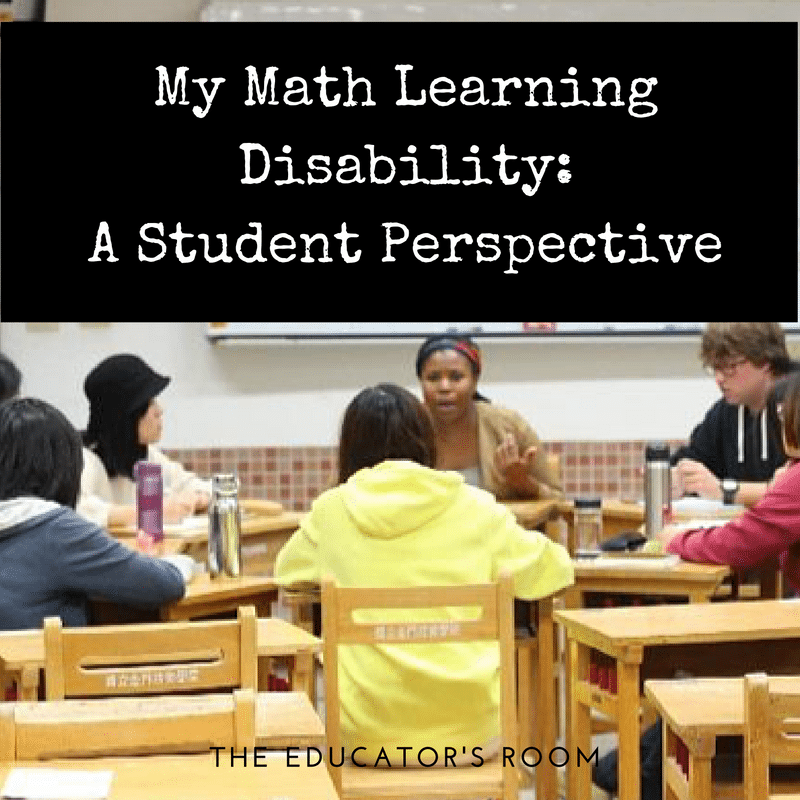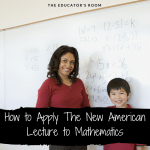As a student with a math learning disability, there are a lot of difficulties I experience in the classroom that get in the way of my learning, including “memory, language, attention, temporal-sequential ordering, higher order cognition, and spatial ordering” (WGBH Educational Foundation, 2002). Many times, as I sit in the classroom, I feel like I will never get it, but, based on the difficulties I experience as a student with a learning disability in math, there are several things you can do to help me become a successful student.
It’s About More Than Just Math
At times, I wish my teachers understood that my learning disability is about more than just math. Sometimes, I appear as if I do not care, but really I just feel frustrated because I have no idea how to do what everyone else in the class seems to do easily (Laureate Education, n.d.-h). In truth, I would rather be anywhere but in the math classroom, and I feel so stressed out that I get headaches and feel anxiety every time I am presented with a task I cannot accomplish easily (Laureate Education). The WGBH Educational Foundation (2002), suggests that it is common for me to feel frustration, pride, and feelings of hopelessness. In order to help me get past these feelings, it would help if more teachers showed empathy and told me it was okay for me to take a little longer to understand (WGBH Educational Foundation). Additionally, since I frequently experience pessimism about my ability to learn, teachers can help me understand what I am good at and help me realize that there is a chance for improvement if I continue to work on my weaknesses and my strengths together (WGBH Educational Foundation). Once I feel more confident that I have a chance to do well, teachers can help me work on my weaknesses.
[fusion_builder_container hundred_percent=”yes” overflow=”visible”][fusion_builder_row][fusion_builder_column type=”1_1″ background_position=”left top” background_color=”” border_size=”” border_color=”” border_style=”solid” spacing=”yes” background_image=”” background_repeat=”no-repeat” padding=”” margin_top=”0px” margin_bottom=”0px” class=”” id=”” animation_type=”” animation_speed=”0.3″ animation_direction=”left” hide_on_mobile=”no” center_content=”no” min_height=”none”][bctt tweet=”it would help if more teachers showed empathy and told me it was okay for me to take a little longer to understand” username=”EducatorsRoom”]
Many difficulties can make it difficult for me to learn math. The older I get, the more these difficulties impair my learning in mathematics. As the WGBH Educational Foundation (2002) states, most of what I learn in math follows a sequence, but not all of my math skills develop in a sequential order, which means that educators do not always recognize the problems as a learning disability. In order to help me learn, teachers need to understand the signs of mathematics difficulties, including output difficulties, organizational difficulties, language difficulties, attention difficulties, ordering difficulties, and difficulties with managing multiple tasks in mathematics (WGBH Educational Foundation). This means that when a math problem involves multiple steps, I sometimes have trouble putting them in order and deciding whether my answer is reasonable or not (WGBH Educational Foundation). Also, learning math facts, formulas, and rules and then recalling them when asked creates problems for me (WGBH Educational Foundation).
[bctt tweet=”most of what I learn in math follows a sequence, but not all of my math skills develop in a sequential order” username=”EducatorsRoom”]
Please Understand: I Really Do Try!
Sometimes my teachers think I have not studied enough because I do not do well on tests, but the truth is that I study frequently and just cannot seem to remember things in time to put them on paper. On top of that, word problems really perplex me. The language problems I encounter in math make it hard for me to understand directions, understand the relevant parts of a word problem, and understanding the vocabulary and language in word problems (WGBH Educational Foundation, 2002). Attention problems make it difficult for me to keep my place while working on math problems and I often become tired when working on math (WGBH Educational Foundation). When teachers give me steps to a problem or write down steps to a math problem, sometimes I cannot get it all down correctly. In fact, the WGBH Education Foundation states that problems with spatial parts of mathematics can lead to these problems and then sometimes being asked to do multiple tasks increase this problem, as I often have trouble managing the requirements of complex math problems. Thankfully, there are many things teachers can do to help me get past these difficulties.
How You Can Help With My Learning Disability
When teachers want me to do well in math class, there are several things they can do to help me find success. First of all, my parents are involved in my education and oftentimes, they try to help me with math problems, but since they work the problems out differently, it makes it harder for me to understand (WGBH Educational Foundation, 2002). However, teachers can communicate with my parents and my tutors so that everyone teaches me in the same way so that I do not have to manage so much information at one time. Another way teachers can increase my ability to understand math concepts is by using what Meyers, Wang, Brownell, and Gagnell (2015) refer to as a “student-centered approach” to solving math calculation problems, where teachers actually persuade students to verbalize and consider numerous approaches to solving math problems, as studies have found that students with teachers utilizing this approach have more success in performance than other students (p. 214). Helping me learn in a variety of ways increases the likelihood that I will learn the concepts covered in class.
Other Approaches to Consider
Along with good communication and the student-centered approach, Meyers, et al. (2015) found that it is important for students to have concrete and visual representations of math concepts so that they can boost their conceptual knowledge and problem-solving skills. By making math more concrete for me, teachers will make it easier for me to understand the concepts so that I can apply them to new situations. Finally, since I have trouble with understanding the language of math and word problems, it is important that teachers address this issue. Research has found that Enhanced Anchored Instruction (EAI), which provides students with “computer-based interactive lessons, videos, and hands-on applied projects” help students like me to solve these “anchored problems” so that we can improve our ability to solve and compute with word problems (Meyers, et al.). Finally, I wish teachers would understand my need for more time to think about problems. By allowing me some planning time prior to starting an assignment, providing me with time to review my work before turning it in, and letting me know ahead of time that I will be called on to solve a problem can help me feel more confident and become more successful (WGBH Educational Foundation). With all of these strategies in place, I will feel less stressed in the classroom and there is a lower likelihood that I will feel inadequate in front of my friends in the classroom.
Closing Thoughts
I want to restate that I really do want to be a better math student, but it is hard for me. I can experience many difficulties, including trouble with completing math problems in the right sequential steps, writing down the steps in order, and fatigue from trying so hard in class. Despite these difficulties, my math teachers can help me get better by encouraging me and by using the above strategies to help me make more sense of math problems. It is important to remember that as frustrating as it might be to you that I have difficulties in math class, the frustration is much higher for me because I have experienced them my whole life. Please take the time to get to know me, my strengths and weaknesses, and allow me an opportunity to improve just like the rest of the class.
References
- Friend, M., & Bursuck, W. D. (2009). Including students with special needs: A practical guide for classroom teachers (5th ed.). Upper Saddle River, NJ: Merrill.
- Laureate Education (Producer). (n.d.-h). Ryan’s story, part one [Video file]. Baltimore, MD: Author.
- Myeres, J. A., Wang, J., Brownell, M. T., & Gagnon, J. C. (2015). Mathematics interventions for students with learning disabilities (LD) in secondary school: A review of literature. Learning Disabilities: A Contemporary Journal, 13(2), 207-235.
- WGBH Educational Foundation. (2002). Misunderstood minds. Retrieved from http://www.pbs.org/wgbh/misunderstoodminds/index.html

[/fusion_builder_column][/fusion_builder_row][/fusion_builder_container]




